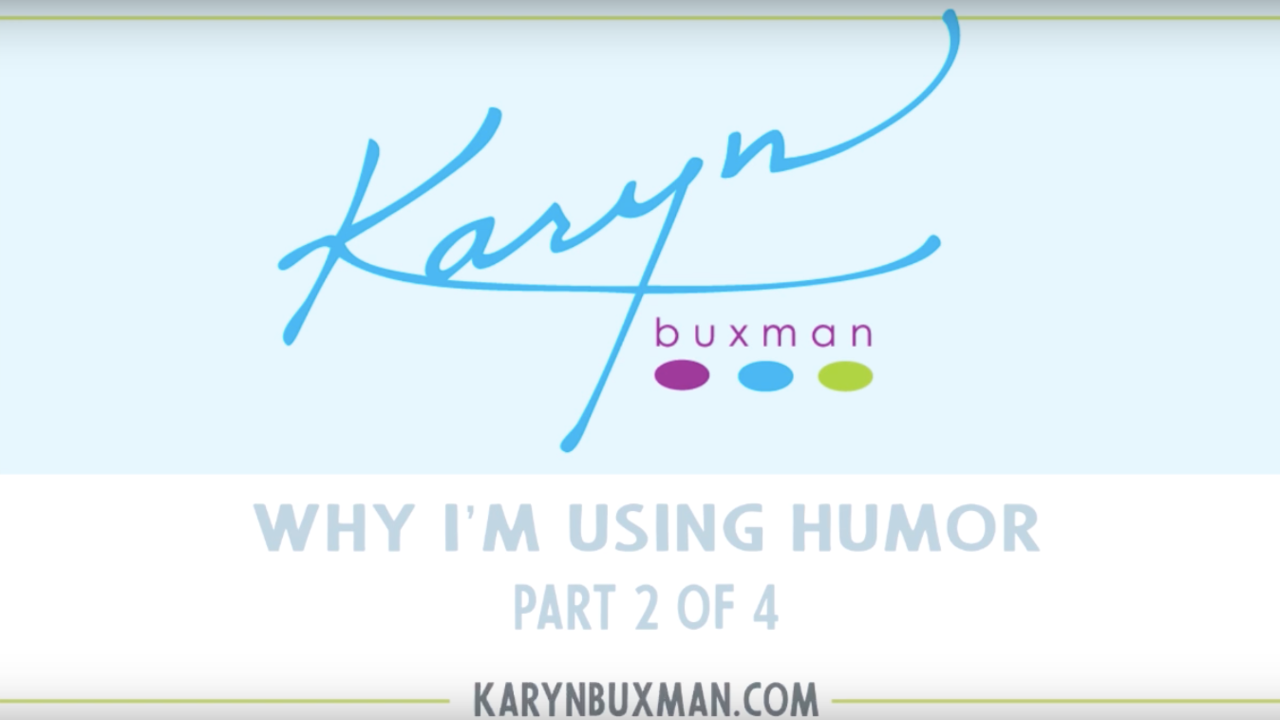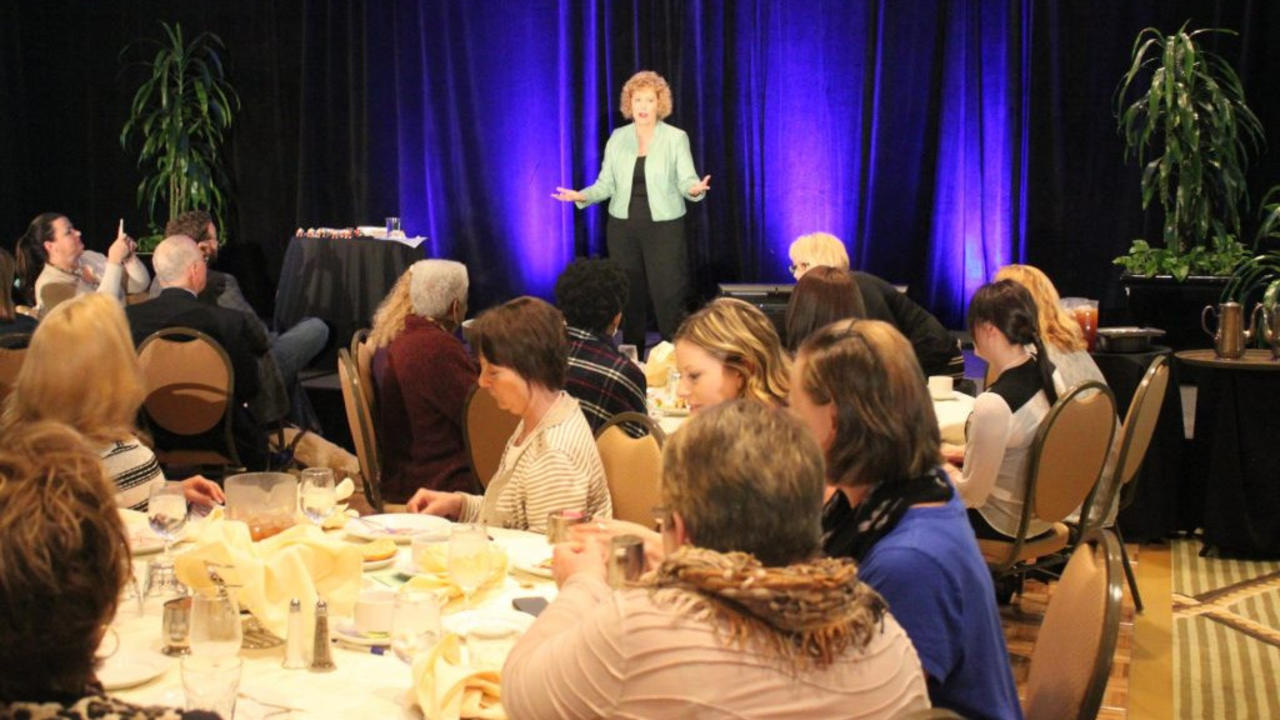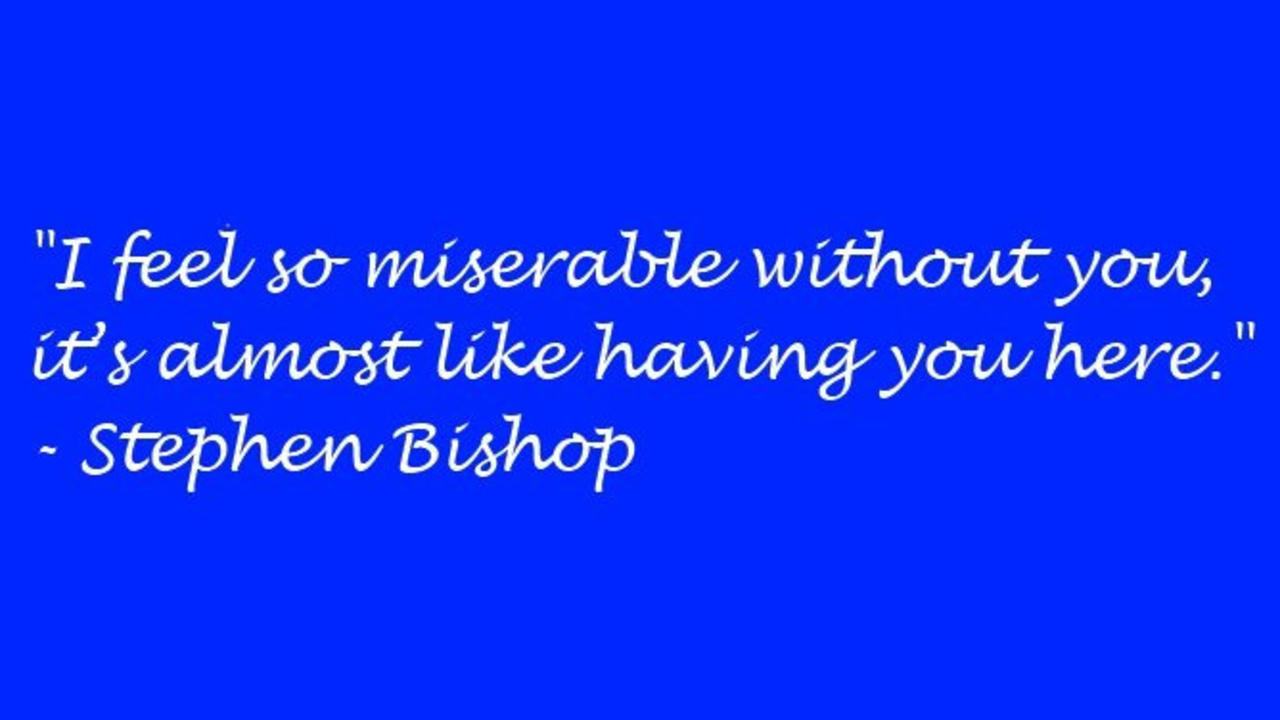Catching up with Karyn
Do You Think You're Funny? - Karyn Buxman

Here’s a question: Do you think you’re funny?
Or better yet, do you think you have a sense of humor? These are important questions to think about when you’re about to set off on a humor journey. Maybe you think you’re really funny, or maybe you wish that you could just get one laugh out of your kids now and then (corny jokes might not land so well on the younger generation). Wherever you might be on your humor journey, it’s important to know that you can always change or better your humor abilities.
Like I’ve been saying for years: it’s more important to see funny than to be funny.
Not all humor has to be comedy, and the main thing to focus on is your ability to tap into your appreciation of humor and the things that amuse you because that’s what’s going to cause you the most joy. The idea of doing this is what I call intentionally looking for humor in your everyday life. It’s a perfect example of how to be able to see funny rather than just being funny. Being mindful of what bri...
OMG! Funny Really DOES Make Money!

A CFO’s Take on Humor in the Workplace
One thousand, four hundred CFOs were asked, “How important is an employee’s sense of humor in him or her fitting into your company’s corporate culture?” Seventy-nine percent of them said that an employee’s sense of humor was important for fitting into a company’s corporate culture. Seventy-nine percent!
Wow! Two things about this impressed me. First, seventy-nine percent is a huge majority. And second, why the heck did they ask CFOs?! One would of thought they’d ask the CEO or director of HR, but I think it’s fantastic that the researchers asked the single most numbers-oriented person in any firm such a “soft” question.
The research also revealed that twenty-two percent said it was “very important,” while twenty percent said it was “not at all important.”
“A little levity goes a long way toward building rapport among colleagues, and diffusing workplace tension,” said Kimberly Stiener-Murphy, a Regional Vice President for Robert Half (which own...
If Seal Is Broken... (Might as Well Laugh)

Everywhere I look, there is some reminder of the election. (There's a job I won't be signing up for!) But then it struck me sometimes, being a nurse is like being President.
No. Air Force One won't be stopping by this morning to bring you to work. The odds are that you don't have a detachment of Secret Service personnel guarding you around the clock. There isn't a brass band that plays "Hail to the Chief" every time you walk in the room (but wouldn't that be cool?).
However, there are some similarities. For one, as a nurse, you are almost guaranteed to share this experience with the President: something will go wrong when you least expect it.
The event was Fortune's Most Powerful Women summit and President Obama began his address. And then THUD! The Presidential Seal on the front of the lectern fell off and hit the floor!
"Oh, goodness," he said. "That's all right." There, with the eyes of the world upon him, President Obama smiled and said, "All of you know who I am."
The audienc...
Humor: What’s Holding You Back?

As I chatted with Brett in his office, several of his staff walked by the door and giggled. One of the young women leaned into the doorway and said, “Don’t be late for your appointment!” and winked.
He waved at her and laughed, saying, “Don’t worry. I’m not backing out!”
He looked at me and laughed. “It’s not what you’re probably thinking! A couple months ago I told my staff that if they could go an entire month without an injury or a safety violation, I’d shave my head! At first I was just joking around. I said it more out of exasperation than seriousness. But the staff pounced on the idea. Before you know it, for the first time in ages, they hit the target. As soon as that happened, they came to me and set up a date to ceremoniously shave my head! Between you and me, my first thought was ‘Oh crap! I’m going to look like a dork!’
“But then I realized I’d achieved two things: Most importantly, we met an important safety target. That’s huge. But the thing that I hadn’t expected was t...
Defusing Difficult Conversations

It was 1984, and the second presidential debate between Walter Mondale and Ronald Reagan was underway. After the first debate, critics observed that Reagan looked tired, and they wondered if he might be too old for the job. Understanding how this precarious issue could affect the outcome of the debate—and the election—Reagan’s team went to work and prepared his response.
Sure enough, shortly after the debate commenced, a reporter asked Reagan, “Given the fact that you are already the oldest president in U.S. history, would you be able to function should a crisis arise?”
Reagan assured the reporter that he’d be perfectly capable of dealing with any situation at hand—and then he quipped—"I will not make age an issue of this campaign. I am not going to exploit for political purposes my opponent's youth and inexperience."
When the laughter died down, so did the question of Reagan’s age. And he was elected president for a second term.
When you’re engaged in a difficult conversation, peo...
Humor as a Negotiation Tool—or—How Humor Saved the World

OCTOBER 1962 — The world held its breath as America and Russia went to the brink, with nuclear weapons at the ready. Russia was installing nuclear missiles in Cuba—a mere 90 miles from the Florida coast. The 13-day crisis played out in real time on TV around the world.
As American and Soviet delegates came together to negotiate, tensions were high, and they soon became deadlocked. And then…a Russian delegate told a joke: “What is the difference between Capitalism and Communism? In Capitalism, man exploits man. In Communism, it is the other way around.”
Delegates on both sides laughed, and this created a bond among all of them. (Hey, ya gotta start somewhere!) With the tension eased for the moment, talks resumed, and eventually a deal was struck that avoided blowing up the planet—no small feat! (You can catch this story on my TEDx talk here.)
Whether you’re negotiating for world peace or for which movie to go to, humor can play a crucial role in your success.
According to a recent s...
“Planned Spontaneity”

The travel gods smiled upon me. My bag and I both arrived at the same airport at the same time, traffic to the hotel zoomed along, and the line for hotel check-in was shorter than the TSA’s.
As I made my way to my room, I observed this hotel’s unique (and somewhat goth) décor: elegant, comfortable... and dark. Dark! Dark! Dark! The walls were black, the furniture was black, I even think the water was black—but I couldn’t tell because, well, it was so DARK. (And I’ll let you guess what color the ballroom floor and the staging were...)
The meeting began and halfway through my presentation, I stepped forward to make a dramatic point...and walked right off the front of the stage. (Picture Wile E. Coyote stepping off a cliff.)
As you might have guessed, the black carpet and the black stage floor merged visually, leaving no hint that there was a drop-off there. The audience gasped, wondering (in the dark) if I was injured; then they held their collective breath. While the stage was only f...
Leadership: “Sarcasm—Handle with Care”

“I’m trying to imagine you with a personality.”
“This isn’t an office. It’s Hell with fluorescent lighting.”
“Don’t bother me. I’m livin’ the dream.”
Sarcasm. Gotta love it, don’t ya? Used for comic effect and dry criticism throughout the ages—by us common folks and by the famous.
Oscar Wilde observed: “Some cause happiness wherever they go; others whenever they go.”
Stephen Bishop said: “I feel so miserable without you, it’s almost like having you here.”
Mark Twain once quipped: “I didn't attend the funeral, but I sent a nice letter saying I approved of it.”
Sarcasm. You hear it nearly every day, from all kinds of people, in all kinds of situations.
[Yeah, we all know—or think we know—exactly what sarcasm is. But for the meticulous among you, here’s the precise definition, according to Webster’s Dictionary: “The use of words that mean the opposite of what you really want to say—especially to insult someone, to show irritation, or to be funny.”]
Sometimes sarcasm works, and so...
Replacing Your Stress Habit: Jest for Stress

We’re cruising down the highway on a sunny California afternoon—the sparkling ocean to our left, the picturesque mountains to our right—then as we come around a curve we see motionless cars stretching for miles and miles ahead of us.
“Shoot! Dang!” cried my husband. (Okay, so those weren’t his exact words. Hey, I want to keep this article rated PG-13!)
His knuckles whitened around the steering wheel, his jaw tensed, his muscles stiffened. “Look at this frakkin’ traffic.” (Note: He actually did use the word “frakkin’.”)
The sight of a traffic jam sent him immediately into a stress response. But I reminded him that we had plenty of time to get to our destination, we had plenty of gas, we had food and drink in the car (and neither of us was in need of a bathroom break!). So rather than fume about traffic I pulled out my phone, and played several episodes of a show that we both find hysterical (Cabin Pressure, a BBC radio sitcom, starring Benedict Cumberbatch). And we relaxed and laughed ...
I Knew That! (Applied Humor: Knowing versus Doing)

“To know and not to do is not to know.” Chinese Proverb
John glanced over his shoulder as he was driving me to my speaking venue and asked, “So you’re the speaker? What do you speak about?”
Ah! Did he know that this is a professional speaker’s favorite question?! “My body of work for the last 25 years has been the study of humor’s relationship to profitability and health. This afternoon I’m going to share how to use humor as a competitive business edge,” I explained, delighted to share my passion with him.
I could see John’s smiling eyes in the rearview mirror. “Did you know that humor is really, really good for you?” he asked in all sincerity. (Yes, I knew that!) John then went on to tell me a somewhat fuzzy version of Norman Cousins overcoming his life-threatening illness by watching funny movies. It was fun to hear someone else extol the benefits of humor—and I was encouraged that the word was getting out to the general public that humor has practical benefits.
As I got out of t...

